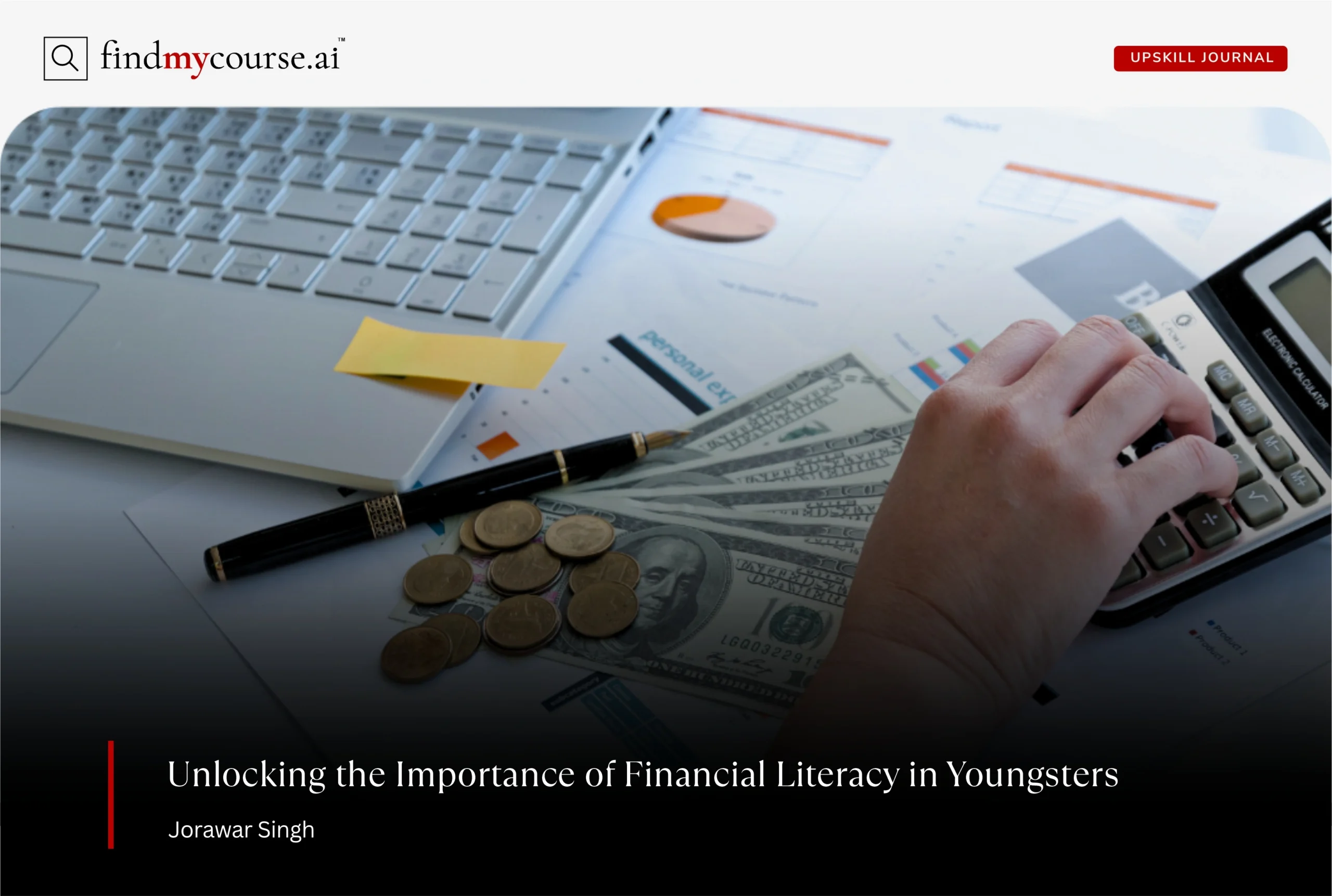Money touches every aspect of life—from the morning coffee you buy to the career choices that shape your future. Yet, despite its central role, many young adults step into independence without the tools to manage it wisely. That’s why the importance of financial literacy for young adults has never been greater.
As students graduate, land their first jobs, and begin building independent lives, their money choices become the blueprint for decades ahead. Without financial literacy, they risk falling into debt traps, struggling with poor budgeting, or missing golden opportunities to grow wealth. But with the right knowledge, young adults gain more than money skills—they unlock confidence, resilience, and the freedom to pursue their dreams. In this blog, we’ll explore the importance of financial literacy, how to start improving it today, and the ways it fuels both professional and personal success.
What Is Financial Literacy?
Before diving deeper, let’s clarify: what is financial literacy? At its core, financial literacy is the ability to understand, manage, and make informed decisions about money. This includes skills such as budgeting, saving, investing, understanding credit, and planning for retirement.
Financial literacy meaning goes beyond numbers—it’s about developing the mindset and habits that enable individuals to align money with life goals. For young adults, this means recognizing how everyday choices (like using a credit card, paying student loans, or starting an emergency fund) affect long-term financial health.
The good news? These skills are learnable. You don’t need a finance degree—just the willingness to study online, read quality resources, or take structured courses that break down money management into digestible lessons.
Why the Importance of Financial Literacy Is Rising
The world has changed dramatically in the last decade. Digital banking, student debt, gig work, and social media-driven spending pressures have transformed the financial landscape. Consequently, the importance of financial literacy has risen as a survival skill rather than a luxury.
According to 2024 global surveys, over 40% of young adults struggle with unexpected expenses. Many also lack retirement savings or fall into high-interest debt early in their careers. These challenges emphasize why financial literacy for students and graduates is more critical than ever.
Moreover, employers increasingly value financially savvy employees. A strong grasp of money management translates into reduced stress, better productivity, and smarter decision-making at work. In short, financial literacy is both a personal and professional asset.
Practical Benefits of Financial Literacy for Young Adults
Understanding personal finance isn’t just about saving money—it’s about building a stable and confident future. Financial literacy gives young adults the tools to make thoughtful decisions about how they earn, spend, and grow their money. Here are some of the key benefits:
1. Smarter Budgeting and Spending
Financially literate young adults know how to create budgets that actually work for them. They can separate wants from needs, plan for bills and essentials, and still set aside money for fun or personal goals. This balance reduces financial stress and helps maintain stability even when unexpected expenses arise.
2. Strong Debt Management Skills
Student loans, credit cards, and buy-now-pay-later options are common financial traps for young adults. Understanding how interest works, how to make timely payments, and how to avoid unnecessary borrowing can prevent years of financial strain. Managing debt wisely saves money, protects credit scores, and promotes financial freedom earlier in life.
3. Early Investment Opportunities
Starting to invest early—even small amounts—can make a huge difference over time. Thanks to compound interest, a 25-year-old who invests regularly will likely build far more wealth than someone who waits until their 40s. Financial literacy helps young adults understand the basics of investing, such as diversification and risk, making long-term growth more achievable.
4. Building Financial Confidence
Confidence in handling money leads to independence. When young adults understand how to budget, save, and invest, they’re less likely to feel anxious about bills or financial decisions. Instead, they can approach money matters with clarity, set realistic goals, and make informed choices that align with their values.
Tools to Improve Financial Literacy
Developing money management skills requires consistent effort, but accessible tools make the journey easier.
1. Explore Financial Literacy Books
There is a wealth of financial literacy books that simplify complex topics. Titles like “The Psychology of Money” or “Rich Dad Poor Dad” remain popular because they connect real-life choices to financial outcomes. Reading a mix of practical guides and mindset-focused works helps learners develop both technical skills and healthy money habits.
2. Enroll in a Financial Literacy Course
A financial literacy course—whether through universities, online platforms, or professional institutions—offers structured knowledge and interactive practice. Courses often cover budgeting, taxes, credit scores, investing basics, and retirement planning. Many are flexible, allowing learners to progress at their own pace while gaining credentials that can enhance employability. One great starting point is Coursera’s Financial Planning for Young Adults, offered by the University of Illinois. This course is tailored for those just beginning their financial journey, with practical lessons on budgeting, credit, insurance, and investing.
3. Financial Literacy for Students
Starting young is key. Schools and universities worldwide are now integrating financial literacy for students into their curricula. For those already in the workforce, self-paced resources fill this gap, helping professionals strengthen money skills while balancing career demands.
Overcoming Common Barriers
Even with countless resources available, many young adults still hesitate to engage with financial education. Understanding why this happens is the first step toward change. Here are some common barriers—and how to move past them.
1. Intimidation by Financial Jargon
Finance often feels like a foreign language, filled with terms like APR, credit utilization, or asset allocation. This complexity can discourage beginners from even getting started. The key is to simplify. Breaking these terms into plain, real-world examples—like understanding how interest adds up on a credit card or how a savings account grows—turns confusion into confidence.
2. The Myth That Money Management Is Only for the Wealthy
Many believe financial planning is something to think about after earning more money. In truth, the opposite is true—the less income you have, the more important financial literacy becomes. Learning to budget on an entry-level salary, avoid debt, and save strategically builds a foundation for long-term financial growth and security.
3. Perceived Lack of Time
Busy schedules often make financial learning feel like a low priority. However, progress doesn’t require hours of study. Just 10 minutes a day—listening to a podcast during a commute, reading a short article, or watching a quick video—can build meaningful knowledge over time. Consistency matters more than duration.
4. Viewing Financial Learning as a One-Time Task
Financial literacy isn’t something to “check off” a list. It’s a lifelong skill that evolves with your goals and circumstances—whether that’s buying a car, managing a mortgage, or planning for retirement. When young adults view it as ongoing personal growth rather than a chore, they’re more likely to stay engaged and confident in their financial journey.
Integrating Financial Literacy into Professional Growth
Financial literacy isn’t just a personal skill—it’s a professional advantage. Understanding money management, investments, and long-term planning can directly influence career decisions and success. When financial knowledge and career development grow together, young adults gain greater freedom and stability in their professional lives. Here’s how financial literacy fuels career growth:
1. Stronger Negotiation Power
Knowing your market value is one thing—understanding how salary, benefits, and retirement contributions affect your long-term financial picture is another. Financially literate professionals can confidently negotiate pay, evaluate compensation packages, and recognize the true value of benefits such as health insurance or 401(k) matching. This confidence leads to fairer pay and better financial outcomes.
2. Greater Career Mobility
Money stress often limits professional choices. When individuals manage debt effectively and maintain financial stability, they gain flexibility to explore new opportunities—like switching careers, pursuing postgraduate education, or starting a business. Financial literacy provides the safety net that allows young professionals to take calculated risks without jeopardizing their stability.
3. Resilience During Economic Changes
Job markets fluctuate, industries evolve, and economic downturns happen. Those who understand saving, investing, and emergency planning are better equipped to adapt. Financial literacy helps professionals stay grounded during uncertain times—whether that means budgeting through a layoff or identifying new income streams when industries shift.
4. A Strategic Investment in Career Growth
Incorporating financial literacy into career upskilling isn’t optional—it’s strategic. Just as you would learn a new software or management skill, understanding how to manage and grow your finances strengthens your overall professional foundation. Financially literate individuals make smarter career choices, build long-term wealth, and experience greater peace of mind at every stage of their careers.
Conclusion
The importance of financial literacy for young adults lies not just in managing today’s paycheck but in shaping tomorrow’s opportunities. By learning how money works, young professionals gain independence, resilience, and the freedom to design the lives they truly want.
From picking up financial literacy books to enrolling in a financial literacy course, every step counts. Whether you’re still in school, just entering the workforce, or seeking career advancement, financial education remains your strongest ally. And if you ever need clarity on financial education or want support in building smarter money habits, just ask our AI assistant for personalized guidance.


